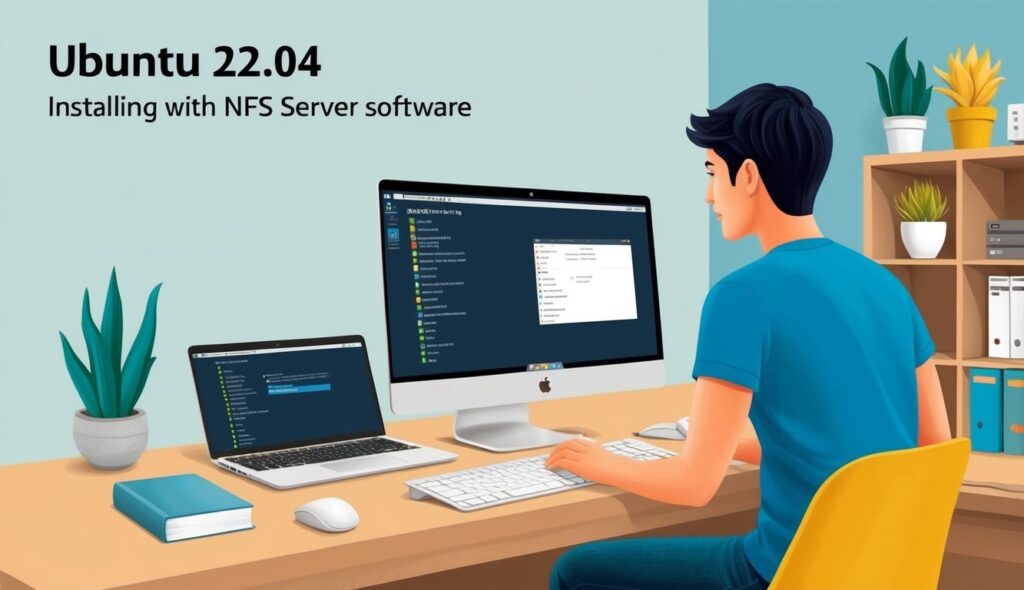Setting up a Network File System (NFS) server on Ubuntu 22.04 allows easy sharing of files across a network. This method is popular for its simplicity and efficiency.
Installing an NFS server on Ubuntu 22.04 involves updating your system, installing the necessary packages, and configuring shared directories.

The process is straightforward and can be completed in a few steps. By following this guide, you’ll learn how to set up an NFS mount on Ubuntu 22.04. This setup enables seamless file sharing between computers on the same network.
Once installed, the NFS server allows other machines to access specified directories as if they were local. This feature is useful for businesses, home networks, and various other scenarios where shared access to files is needed.
Table of Contents
Key Takeaways
- NFS enables efficient file sharing across networked computers
- The installation process requires specific software packages and configuration steps
- Proper setup ensures secure and reliable file sharing on Ubuntu 22.04
Preparing Ubuntu for NFS Installation

Before setting up NFS on Ubuntu 22.04, you need to update your system and install the required packages. These steps ensure your server is ready for a smooth NFS installation.
Update and Upgrade System Packages
Start by updating the package index on your Ubuntu server.
sudo apt update
This command refreshes the list of available packages and their versions.
Next, upgrade installed packages to their latest versions:
sudo apt upgrade -y
The -y flag automatically answers “yes” to prompts, speeding up the process.
Reboot your system if the upgrade installs a new kernel or makes significant changes:
sudo reboot
Installing Necessary Components
After updating, install the NFS server package. On Ubuntu 22.04, the main package is nfs-kernel-server:
sudo apt install nfs-kernel-server
This command installs the NFS server and its dependencies.
For client systems that will connect to the NFS server, install the nfs-common package:
sudo apt install nfs-common
These packages provide the needed NFS functionality. The installation process is quick and straightforward. Once complete, your Ubuntu system is ready for NFS configuration.
Configuring NFS Server
Setting up an NFS server involves several key steps to ensure proper functionality and security. This process includes creating export directories, configuring access permissions, and adjusting firewall settings.
Creating the NFS Export Directory
To begin, create a directory that will be shared with NFS clients. This shared directory will serve as the mount point for remote systems.
sudo mkdir /mnt/nfs_share
Set the appropriate permissions for this directory. It’s crucial to ensure that the NFS client can access the shared files.
sudo chown nobody:nogroup /mnt/nfs_share
sudo chmod 777 /mnt/nfs_share
These commands set the ownership to “nobody” and “nogroup” and grant full read, write, and execute permissions to all users.
Editing the Exports Configuration
The NFS server uses the /etc/exports file to manage which directories are shared and with whom. Edit this file to add your NFS export.
sudo nano /etc/exports
Add a line to share the directory:
/mnt/nfs_share client_IP(rw,sync,no_subtree_check)
Replace “client_IP” with the actual IP address of your NFS client. The options in parentheses define the access permissions:
- rw: Allows read and write access
- sync: Forces NFS to write changes before replying
- no_subtree_check: Prevents subtree checking
Setting Up Host Access and Permissions
NFS relies on the RPC (Remote Procedure Call) service. Ensure that RPC is running:
sudo systemctl start rpcbind
sudo systemctl enable rpcbind
To enhance security, you can restrict NFS access to specific IP addresses or subnets. Edit the /etc/hosts.allow file:
sudo nano /etc/hosts.allow
Add a line to allow access:
rpcbind: client_IP
Applying the Configuration and Starting the Service
After making changes to the exports file, apply the new configuration:
sudo exportfs -a
Start the NFS server service:
sudo systemctl start nfs-kernel-server
sudo systemctl enable nfs-kernel-server
These commands start the NFS service and enable it to start automatically on system boot.
Adjusting Firewall Settings for NFS
If you’re using UFW (Uncomplicated Firewall), you need to allow NFS traffic. NFS uses port 2049 by default.
sudo ufw allow from client_IP to any port nfs
sudo ufw reload
This rule allows NFS traffic from the client IP address. Replace “client_IP” with the actual IP of your NFS client.
To verify the firewall settings:
sudo ufw status
Frequently Asked Questions
Installing and configuring an NFS server on Ubuntu 22.04 involves several key steps. Users often have questions about the installation process, security measures, and troubleshooting common issues.
What are the steps for installing an NFS server on Ubuntu 22.04?
To install an NFS server on Ubuntu 22.04, users need to update their package lists and install the necessary packages. The main command for installation is:
sudo apt install nfs-kernel-server
After installation, the NFS service needs to be started and enabled to run at boot.
How do I configure an NFS server after installation on Ubuntu 22.04?
Configuring an NFS server involves editing the /etc/exports file to define which directories to share. Users need to specify the directory path, allowed clients, and access permissions.
Example configuration line:
/shared/directory clientIP(rw,sync,no_subtree_check)
After making changes, the exports need to be updated using the exportfs command.
What packages do I need to install for setting up NFS on Ubuntu 22.04?
The main package required for setting up an NFS server on Ubuntu 22.04 is nfs-kernel-server. This package provides the necessary components for NFS functionality.
For NFS clients, the required package is nfs-common.
How can I secure my NFS server installation on Ubuntu 22.04?
Securing an NFS server involves several steps:
- Use firewalls to restrict access to NFS ports.
- Implement IP-based access control in the /etc/exports file.
- Use Kerberos authentication for enhanced security.
It’s also important to keep the system updated with the latest security patches.
What is the process for mounting an NFS share on a client in Ubuntu 22.04?
To mount an NFS share on a client, users need to:
- Install the nfs-common package.
- Create a mount point directory.
- Use the mount command to connect to the NFS share.
Example mount command:
sudo mount serverIP:/shared/directory /local/mountpoint
How do I troubleshoot common NFS issues on Ubuntu 22.04?
Common troubleshooting steps for NFS issues include:
- Checking firewall settings on both the server and the client.
- Verifying the NFS service status using systemctl.
- Examining server logs in /var/log/syslog for error messages.
Users can also use the showmount command to verify available NFS shares on the server.



Great post! You’ve made setting up an NFS server on Ubuntu 22.04 sound so accessible and straightforward. Quick question – once the NFS server is up and running, how can I ensure it’s secured against unauthorized access? Also, if anyone’s interested in more about Python and AI, check out https://sebbie.pl/tag/python/. It’s got some similar topics that might be useful for those diving deeper into these areas.